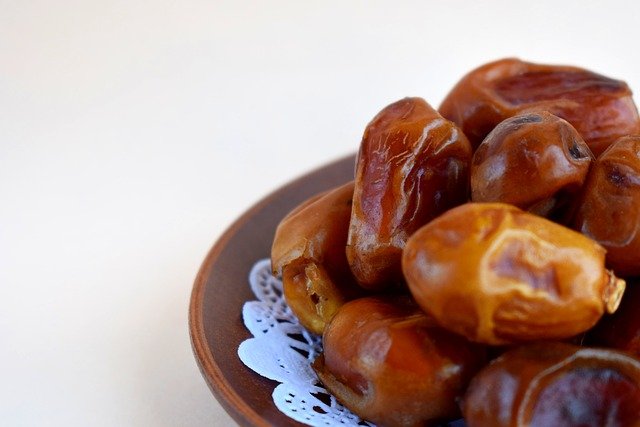Dates are an incredibly sweet addition to your pregnancy diet. They are delicious and rich in vitamins.
Though the extra sweetness may not be appealing for some pregnant mothers, several myths suggest they can help induce labor.
Here are a few facts about dates and the benefits and side effects of eating dates during pregnancy.
Origin of dates
Dates originated from the Middle East and have been cultivated as food for more than 6000 years. They contain about 60-70% sugar and grow on the date palm tree (Phoenix dactylifera).
During the month of Ramadan, they are considered holy fruit and are included in a variety of cuisines. The use of dates for labor induction stems from the story of the birth of Jesus under a date palm tree.
It is written in the Holy Quran that as Mary suffered from labor pains, she strolled towards a date palm tree and rested. Then at that moment, she heard a voice telling her to shake the tree above her and eat the fresh, ripe dates. These myths and many other studies have backed the use of dates to induce labor.
To date, there are so many varieties of dates, but the two most commonly cultivated dates in the United States and other non-middle Eastern regions are the Medjool and Deglet Noor dates.
- Medjool dates: These dates are very sweet and chewy and can grow up to 2 inches long. They contain more fructose than sucrose and are often used as a sugar substitute in most cuisines. 100 grams (about 4 dates) of Medjool dates will give you about 277 calories.
- Deglet Noor dates: These semi-dry dates are the most popular dates you can find around. They measure about 1 inch and contain about 282 calories in 100 grams (about 5-6 dates). They also contain similar amounts of fructose and sucrose.
Benefits of Dates in Pregnancy
Due to their high fructose content, dates offer lots of energy and nutrients if you eat them during pregnancy. Here are the incredible benefits of eating dates:
Rich in antioxidants
Dates are rich in antioxidants – substances that fight against disease-causing free radicals.
One study found that dates have the highest concentration of a type of antioxidant called polyphenols among dried fruits.
Eating dates can help protect your body cells against cancer and other metabolic diseases.
Rich in dietary fiber
Dates contain a lot of dietary fiber, which helps prevent constipation in pregnancy.
Five Deglet Noor dates will provide you with 7 grams of dietary fiber which equals 25% of the recommended daily intake of 20 to 35 grams.
Rich in folate
This super pregnancy fruit is a good source of the B-vitamin, folate which helps to reduce the likelihood of birth defects such as spina bifida.
100 grams of dates will provide you with about 15 mcg of folate.
Rich in healthy fats
Date fruit contains a rich amount of saturated and unsaturated fatty acids such as oleic, linoleic, and linolenic acids.
These healthy fats help to save and supply energy for the construction of prostaglandins during labor.
Prostaglandins help the cervix to dilate and contractions to occur.
Good source of potassium
Dates contain about 700 grams of potassium in 100g which is about 14% of the recommended daily intake of 4700 mg.
Potassium is an essential element that helps to keep your blood pressure in check and maintain proper electrolyte balance during pregnancy.
Good source of iron
Dates are good sources of dietary iron, which may help prevent iron deficiency anemia in pregnant mothers who are at a higher risk.
They also provide magnesium and vitamin K. Two essential nutrients that aid bone development and effective blood clotting.
Can Eating Dates Help Induce labor?
There have been so many stories over the years on the effectiveness of dates in inducing labor. These stories have led researchers to find real evidence on the role of dates in pregnancy.
In a study published in the Journal of Midwifery and Reproductive Health, researchers looked at the effect of date consumption in prompting cervical ripening in pregnant mothers who were 37-38 weeks.
After the study, researchers found that mothers who ate 70-75 grams of dates every day until the onset of delivery had lower rates of c-section, lower rates of vacuum or forceps use, lower rates of oxytocin use, and higher Bishop scores at the onset of labor.
In another study, researchers had 65 women eat 6 dates a day for 4 weeks leading to their date of delivery and left 45 pregnant women without any dates.
At the end of the study, spontaneous labor occurred in 96% of those who consumed dates, compared with 79% of women in the non-date fruit consumers. Also, the women who ate dates had lower rates of oxytocin use and a shorter first stage of labor.
Although the researchers did not specify the exact variety of dates used for their experiments, based on these findings, they believe that consuming dates before delivery will reduce the need for labor induction and augmentation.
Still, more research is needed to confirm if it works for all women.
Also read: Best Lactation Supplements to help Increase Milk Supply Quickly
How to eat dates during pregnancy
If you love dates, you can simply nibble on them as you move up to your due date.
But if you find them overwhelmingly sweet, here are a variety of ways to add them to your diet:
- Smoothie: Add six date fruits to your favorite smoothies and blend. Or mix the fruits with a cup of yogurt and blend.
- Snacks: Chew a mixture of roasted peanuts and dates, or dip them in peanut butter. It is delicious.
- Syrup: Make a delicious date syrup at home by blending a few date fruits with milk. Drizzle the mixture over your oatmeal or cereal.
- Baked goods: Grate dates and add them to your pie, cakes, cookies, and muffins. It adds an extra layer of deliciousness.
- Salads: Grate the fruits over your chicken and tuna salad. It adds a subtle sweet taste.
- Wraps: Use dates to make savory or sweet fillings with lemon peel, blue cheese, candied orange, or even nuts like pecans, pistachios, and almonds.
- Sweetener: Because of their rich fructose content, grate in dates to replace sugar in milk and other drinks.
Potential side effects of dates in pregnancy
There is no scientific evidence showing any negative side effects of eating dates during pregnancy.
However, if you have been diagnosed with gestational diabetes during pregnancy, it is best to consult with your doctor or midwife before eating dates. As the high sugar content in dates can easily surpass the amount of sugar your body needs in a day.
Also, some people may have an allergy to dates and should avoid them.
The bottom line
Dates are a delicious superfruit that is great in pregnancy, especially in the last trimester.
They provide you with antioxidants, fiber, folate, potassium, magnesium, iron, and vitamin K.
It wouldn’t hurt to nibble on a few towards the last weeks of your pregnancy.
Sources
- Rahmani A et al. Therapeutic effects of date fruits (Phoenix dactylifera) in the prevention of diseases via modulation of anti-inflammatory, antioxidant and anti-tumour activity. 2014
- Vinson J. et al,. Dried fruits: excellent in vitro and in vivo antioxidants. 2005.
- Masoumeh K. et al. The Effect of Late Pregnancy Consumption of Date Fruit on Cervical Ripening in Nulliparous Women. 2014
- Al-Kuran O. et al. The effect of late pregnancy consumption of date fruit on labor and delivery. 2011
Get new free and exclusive health tips delivered straight to your inbox!



